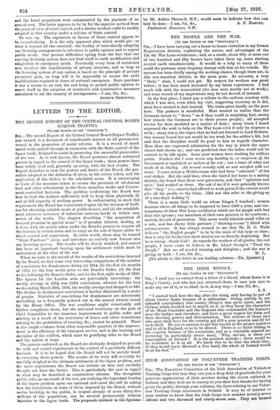LETTERS TO THE EDITOR.
THE SECOND REPORT OF THE CENTRAL CONTROL BOARD (LIQUOR TRAFFIC).
[TO VIZ EDITOR or THZ " SPECTATOR.") Sne—The second Report of the Central Control Board (Liquor Traffic), just isssued, is a document of considerable interest to all persons con- cerned in the promotion of social reforms. It is a record of much useful work carried through in connexion with the State control of the liquor trade, designed to assist in promoting the successful prosecution of the war. As is well known, the Board possesses almost unlimited powers in regard to the control of the liquor trade ; these powers have been widely used and, generally speaking, with the best results. The Report describes in turn the powers and duties of the Board, the pro- cedure adopted in the definition of areas, in the action taken, and the application of the Orders to the scheduled areas. It is encouraging to learn of the measures taken to ensure the provision of wholesome food and other refreshment in the State munition works and Govern- ment-controlled factories. Tho problem confronting the Board was how to feed the workers sufficiently well to keep them physically fit and at full capacity of working power. In endeavouring to meet this requirement the Board has concentrated upon (a) the increase of facili- ties for obtaining suitable meals at public-houses, and (b) the establish- ment wherever necessary of industrial canteens inside or within easy access of tho works. The chapter describing " the acquisition of licensed premises in special areas" is of peculiar interest, dealing, as it does, with the action taken under the Board's powers to acquire all the licences in certain areas and to carry on the sale of liquor under its direct control and supervision. In other words, these may be termed "State Purchase" areas, and introduce an entirely new feature into our licensing system. The results will be closely watched, and cannot but have an important bearing upon the settlement which must be undertaken at the close of the war.
When we turn to the record of the results of the restrictions imposed
by the Board, we find some very interesting comparisons of the number of convictions for drunkenness during (a) 1914, (b) the first six months of 1915, (c) the four weeks prior to the Board's Order, (d) the four weeks following the Board's Order, and (e) the first eight weeks of 1916. Tho figures for the London area are particularly interesting : the weekly average in 1914.. was 2,034 convictions, whereas for the four weeks ending March 26th, 1916, the weekly average had dropped to 940. The decline in drunkenness convictions is further illustrated by a series of graphs. Statistics of convictions for drunkenness are notoriously misleading, as is frequently pointed out in the annual returns issued by the Homo Office. The war conditions might conceivably still further complicate them, but the universal testimony on the part of Chief Constables to the immense improvement in public order and sobriety as a result of the restriction of hours and other restrictions relating to the prohibition of treating, &c., cannot be gainsaid. There is also ample evidence from other responsible quarters of the improve- ment in the efficiency of the transport service, and in the training and discipline of the soldiers, which must be gratifying alike to the Board and the nation at large.
The powers conferred on the Board are obviously designed to provide
for wide and varied experiments in the control of a peculiarly difficult business. It is to be hoped that the Board will not be unduly timid in exercising these powers. The results of its work will certainly be carefully weighed in the ultimate settlement of the liquor problem, and the more experiments the Board can initiate on wise and carefully thought out lines the better. This is particularly the case in regard to what may be described as constructive reforms. The thoughtful public, who, as one result of the war, are realizing the important bearing of the liquor problem upon our national and social life, will be asking bow the restrictions, or some of them, imposed by tho Board, without undue hardship to the public, in respect already of some thirty-five millions of the population, can be secured permanently without injustice to the liquor trade. The proposals outlined in the Spectator
by Mr. Arthur Sherwell, M.P., would seem to indicate how this can






























 Previous page
Previous page